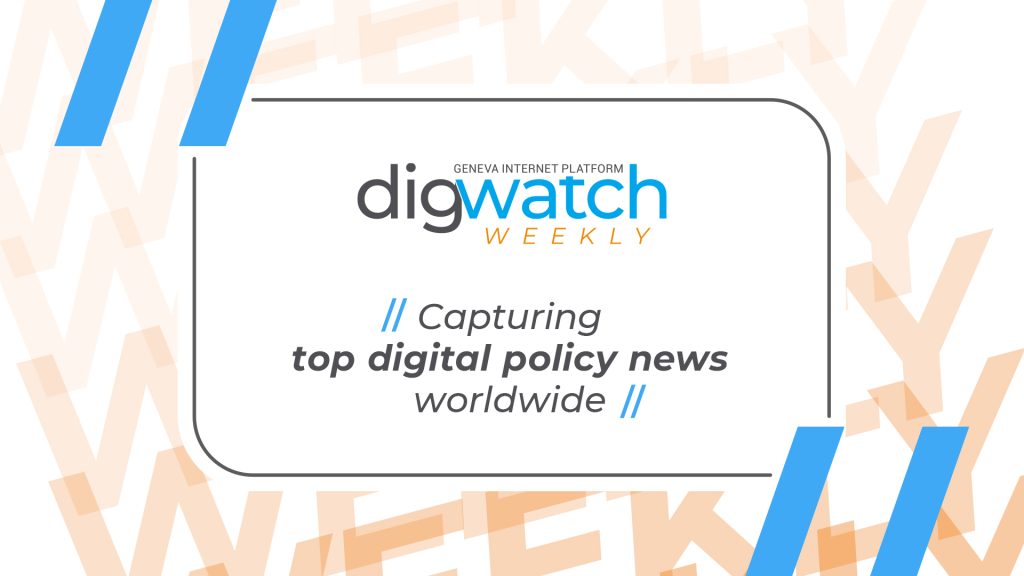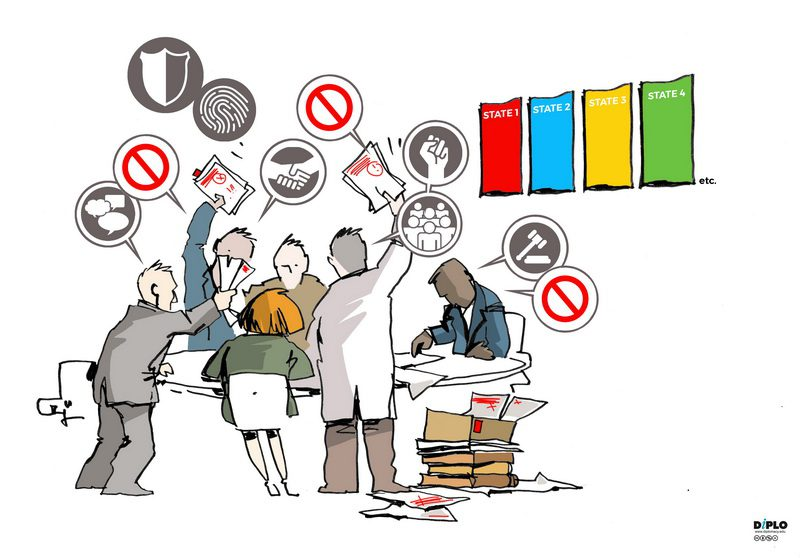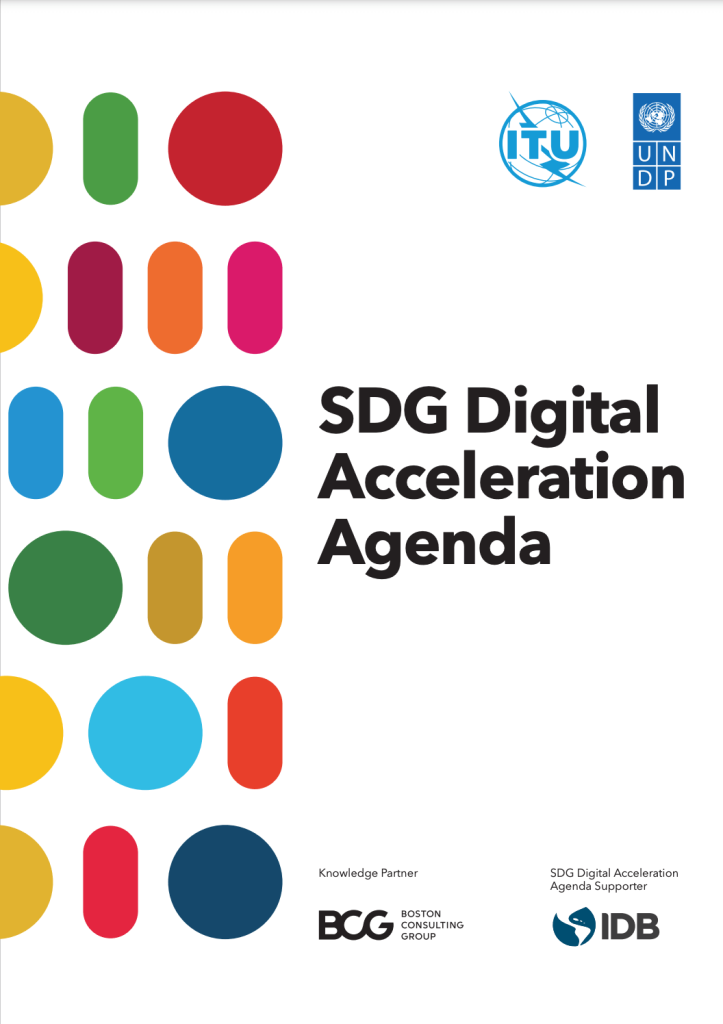
Snapshot: What’s making waves in digital policy?
Geopolitics
The European Commission has released a preliminary list of four high-risk technology areas for potential misuse by autocratic regimes and human rights violations; experts say this is aimed at China. On the other side of the pond, as Washington weighs additional restrictions on chip exports, US companies will continue to sell chips to China, but not the most advanced ones. China’s trade council has called on the US to reconsider rules restricting American investments in China’s tech sector. The council argues that the restrictions are vague and do not differentiate between military and civilian applications.
AI governance
G7 countries have agreed to create an international code of conduct for AI that would establish principles for the oversight and control of advanced forms of AI. In a similar development, Japan (the current chair of the G7) and Canada have released voluntary codes of conduct for companies developing AI – this follows the recent trend of using voluntary guidelines until regulations are enacted.
The British anti-trust regulator, the Competitions and Markets Authority (CMA), proposed seven principles to guide the development and deployment of AI foundational models (technology trained on vast amounts of data to carry out a wide range of tasks and operations). Finally, The USA announced plans to present a proposal of global standards for the use of military AI at the UN in the near future.
Security
The International Committee of the Red Cross (ICRC) has issued eight rules of engagement for hacktivists who are involved in conflicts, warning them that their actions can endanger lives. The rules include a prohibition on cyberattacks targeting civilians, hospitals, and humanitarian facilities, as well as the use of malware or similar tools that can harm both military and civilian targets.
Infrastructure
The US Federal Communications Commission (FCC) is planning to restore the net neutrality rules that were repealed in 2017. FCC Chairperson Jessica Rosenworcel announced that the FCC proposes to reclassify broadband under Title II of the US Communications Act. That would give the FCC more authority to regulate internet providers, including the ability to prevent carriers from slowing down or speeding up internet traffic to certain websites.
Huawei, the Chinese tech giant, has taken legal action in a Lisbon court against a resolution by Portugal’s cybersecurity council (CSSC), which effectively restricts operators from employing its equipment in high-speed 5G mobile networks.
Internet economy
The European Commission has designated 6 major tech companies, including Alphabet, Amazon, Apple, ByteDance, Meta, and Microsoft, as gatekeepers under the Digital Markets Act (DMA), concluding a 45-day review process. The designation includes a total of 22 core platform services provided by these companies.
In another area, Amazon has temporarily secured a victory in a case concerning its classification as a Very Large Online Platform (VLOP). The General Court of the Court of Justice of the EU (CJEU) in Luxembourg has, in response to Amazon’s plea, granted interim measures, resulting in the postponement of certain DSA obligations. This takes place amid the initiation of stringent measures under the EU Digital Services Act (DSA), affecting 19 major online platforms and search engines.
(Alleged) Anti-competitive practices by major companies were in the spotlight last month. The US Federal Trade Commission (FTC) and 17 state attorneys general sued Amazon for alleged anti-competitive behaviour. One of the biggest antitrust cases in decades, The US Justice Department’s case against Google commenced on 12 September 2023. This lawsuit focuses on Google’s search business, which is alleged to be ‘anti-competitive and exclusionary,’ enabling the company to maintain a monopoly in the digital advertising market. In a different case also concerning Google, the company announced a provisional settlement in the USA on monopoly allegations concerning the Play Store application platform.
The European Commission has been informally collecting views on potentially abusive practices by Nvidia, Bloomberg revealed. This comes after France’s competition authority carried out an ‘unannounced inspection […] in the graphics cards sector’, which was revealed to involve Nvidia.
Digital rights
Reporters Without Borders (RSF) has called for public input in drafting the AI Charter to clarify the journalism community’s position on the extensive use of AI technologies in the field.
Norway’s data watchdog hopes to extend its daily fines of NOK 1 million (USD93,000) for privacy breaches against Meta across the EU and European Economic Area (EEA). Now, it is up to the European Data Protection Board (EDPB) to evaluate the situation.
Content policy
A federal appeals court in the USA has extended limits on the Biden administration’s communication with social media platforms, to also encompass the US Cybersecurity and Infrastructure Security Agency (CISA). This ruling significantly trims the ability of the White House and government agencies to engage with social media platforms on matters of content moderation.
Development
The EU has released its Digital Decade report, urging actions to achieve Digital Decade targets by 2030.
New ITU data shows global internet access improved in 2023, with over 100 million new users worldwide.
The G77 Summit adopted the Havana Declaration, focusing on science, technology, and innovation and outlining the G77’s future actions.
THE TALK OF THE TOWN – GENEVA
During the 54th session of the UN Human Rights Council (UNHRC), a panel discussed cyberbullying against children, discussing the roles of states, the private sector, and stakeholders in addressing cyberbullying and empowering children in the digital sphere. Additionally, the council presented a summary report on the role of digital, media, and information literacy in the promotion and enjoyment of the right to freedom of opinion and expression from the 53rd session. The council also heard a report on the impact of new technologies intended for climate protection.
The WTO Public Forum 2023 focussed on the role of trade in fostering an eco-friendly future, including the theme ‘Digitalisation as a tool for the greening of supply chains’. Over 20 sessions delved into digital tools and their impacts.
The 8th session of the WIPO Conversation delved into generative AI and IP. Over two days, 6 panels covered generative AI’s use cases, regulatory landscape, ethical concerns regarding training data, authorship, ownership of creative work, and strategies for navigating IP in generative AI.
Digital at UNGA78
The General Debate of the UN General Assembly (UNGA) serves as a global platform where world leaders come together to address some of the most pressing issues confronting humanity. One of these critical topics is the impact of digital technologies.
During the 2023 UNGA General Debate, 94 speakers, including the Secretary-General of the UN, and representatives of the Holy See and the EU, delved into digital themes.
This number (94) represents a significant increase compared to our first analysis in 2017, when 47 countries spoke on digital topics. Fast forward 7 years, and this number has doubled to 94. This sharp rise underscores the growing recognition of the paramount importance of digital technologies at the highest levels of diplomatic discourse.
In the broader context, discussions related to digital technology accounted for 2.51% of all the text corpus produced during 2023 UNGA’s speeches.

The General Debate in 2023 saw a substantial surge in mentions of AI in national statements. Out of the 467,130 words spoken during the debate, 6,279 were about AI, solidifying its position as the most frequently discussed digital topic. This surge in interest can be attributed, in part, to the widespread attention garnered by the launch of ChatGPT.
AI featured prominently in 39 speeches during UNGA 78, reflecting its growing significance. However, leaders also explored other digital-related subjects, including digital development (44), cybersecurity (23), content policy (7), economic considerations (4), and human rights (6).
AI. The rapid evolution of AI prompted concerns about its potential risks, from job displacement to cyber threats. While some speakers highlighted AI’s transformative potential in healthcare and education, many emphasised the need for ethical governance and international cooperation. There was consensus on the urgency of regulating AI, addressing its military applications, and establishing global norms. The role of the UN in facilitating these discussions and promoting responsible AI use was a recurring theme, with calls for a Global Digital Compact and the creation of an international AI agency.
Digital development. Leaders emphasised the need to bridge the digital divide, reduce inequalities, and ensure inclusive digital development. Many nations advocated for international cooperation through initiatives like the Global Digital Compact to address these challenges collectively. The importance of digital technologies in achieving sustainable development goals and fostering global solidarity was a common theme among leaders.
Cybersecurity. The evolving landscape of non-traditional security threats, focusing on cybersecurity and cybercrime, was discussed. Leaders emphasised the need for international cooperation and governance frameworks to address cross-border cyber threats, protect critical infrastructure, and combat cybercrime.
Content policy. Leaders addressed the concerning spread of disinformation and fake news amplified by AI and social media platforms. They highlighted the threats posed to democracy, and an increase in real-world violence and conflict caused by online hate speech and misinformation. Efforts to combat disinformation included proposals for a digital bill of rights and a code of conduct for information integrity on digital platforms.
Economic. The importance of embracing digital technology and fostering innovation to enhance economies was emphasised. Efforts to reduce trade barriers, seek free trade agreements, and transition into digital and green economies were highlighted.
Human rights. Leaders expressed concerns about online surveillance, data harvesting, and human rights abuses. They called for human-centred and human-rights-based approaches to the development and deployment of technology.

Should we let AI hallucinate?
This year, Diplo’s human experts were joined by DiploAI in analysing speeches. They distilled key points and spotted patterns in speeches, including instances where AI hallucinated – created false information or distorted reality. Diplo’s Jovan Kurbalija suggests we just might want to let it do this in his newest blog post Diplomatic and AI hallucinations: How can thinking outside the box help solve global problems?

The EU’s Digital and AI Vision in 2023: Von der Leyen’s Address
In the 2023 State of the Union Address, European Commission President Ursula von der Leyen laid out her vision for the digital future of Europe, with a particular emphasis on the role of AI. The speech highlighted Europe’s achievements in the digital realm and the steps being taken to address the challenges and opportunities presented by AI and digital technologies.

Von der Leyen delivering her address. Credit: European Comission.
Europe’s Investment in digital transformation
President von der Leyen began by acknowledging the importance of digital technology in simplifying both business and everyday life. She pointed out that Europe had exceeded its investment target in digital projects under NextGenerationEU, with member states using this funding to digitise key sectors such as healthcare, justice, and transportation.
Managing digital risks and protecting fundamental rights
However, the president also acknowledged the challenges posed by the digital world, including disinformation, harmful content, and privacy risks. She stressed that these issues eroded trust and violated fundamental rights. To counter these threats, Europe has taken the lead in safeguarding citizens’ rights through legislative frameworks like the DSA and the DMA, which aim to create a safer digital space and hold tech giants accountable.
The role of AI
President von der Leyen highlighted the potential of AI to revolutionise healthcare, increase productivity, and address climate change. But she also warned against underestimating the real threats posed by AI. Citing the concerns of leading AI developers and experts, she emphasised the importance of mitigating AI-related risks on a global scale.
Three Pillars for a Responsible AI Framework
The president outlined three key pillars for Europe’s leadership in shaping a global AI framework: Guardrails, governance, and guiding innovation.
- Guardrails: Ensuring AI development remains human-centric, transparent, and responsible. The AI Act, a comprehensive pro-innovation AI law, was presented as a blueprint for the world. The focus now is on adopting the rules promptly and moving towards implementation.
- Governance: Establishing a single governance system in Europe and collaborating with international partners to create a global panel similar to the Intergovernmental Panel on Climate Change (IPCC) for AI. This body would provide insights into the impact of AI on society and ensure coordinated global responses.
- Guiding Innovation: Leveraging Europe’s leadership in supercomputing by opening up high-performance computers to AI start-ups for training their models. Additionally, fostering an open dialogue with AI developers and companies, akin to the voluntary safety, security, and trust rules adopted by major tech companies in the USA, is a crucial step.
Ad Hoc Committee on Cybercrime: Key takeaways from the 6th session
The 6th session of the UN Ad Hoc Committee on Cybercrime finished its work, yet many issues remain open. With the final round being scheduled for February 2024, states still have not yet agreed on whether to use the term cybercrime or ICTs for malicious purposes in the convention.
The latest draft (updated on 1 September 2023) had states debating over the scope of the convention, with China and Russia expressing their concern that the evolving landscape of information and communication technologies (ICTs) has not been adequately addressed. Regarding the criminalisation of offences, Russia emphasised the need to criminalise the use of ICTs for extremist and terrorist purposes, and together with Namibia and Malaysia, among other countries, supported the inclusion of digital assets regarding the laundering of proceeds of crimes. At the same time, countries, including the UK and Australia, opposed their inclusion, claiming that it does not fall within the convention’s scope.
Human rights provisions have raised concerns not only among the states but stakeholders as well. Namely, Microsoft stated that the current provisions enshrined under the latest draft could be ‘disastrous for human rights’. With regards to data protection measures, South Africa, the USA, and Russia proposed the collection of traffic data and interception of content data. At the same time, Singapore and Switzerland opposed this proposal, with the EU stressing that such measures threaten human rights and fundamental freedoms.
Negotiations on international cooperation also faced challenges, with Russia highlighting the importance of distinguishing between the location of data custodians and the places where data processing, storage, and transmission occur, especially in cloud computing. Additionally, countries including Pakistan, Iran, China, and Mauritania proposed the inclusion of Article 47 bis on cooperation between national authorities and service providers. Essentially, the cooperation should include reporting cybercrime offences as established under the convention, sharing expertise, training, preserving electronic evidence, and ensuring the confidentiality of requests received from law enforcement authorities.
An interesting proposal was that of Costa Rica and Paraguay to include the word ‘sustainability’ in Articles 52 and 56 for effective assistance and addressing cybercrime’s societal impact.
So the question remains: Have states agreed on the provisions? No. Will states debate a final round in February 2024? Yes. What will happen in case there is no consensus? The Bureau of the UN Office on Drugs and Crime (UNODC) will step in and confirm that two-thirds of the majority of present and voting representatives shall take the decisions.

Upcoming: IGF 2023
The 2023 edition of the Internet Governance Forum (IGF) will be held in Kyoto, Japan, 8–12 October, under the theme ‘The internet we want – empowering all people’.
The programme is developed around eight sub-themes:
- AI and emerging technologies
- Avoiding internet fragmentation
- Cybersecurity, cybercrime and online safety
- Data governance and trust
- Digital divides and inclusion
- Global digital governance and cooperation
- Human rights and freedoms
- Sustainability and environment
The forum will feature approximately 300 sessions, with a plethora of formats, including high-level sessions, main sessions, workshops, open forums, town halls, lightning talks, launches and awards, networking sessions, day 0 events, dynamic coalition sessions, and national and regional initiatives (NRIs) sessions.
Additionally, the IGF village, where 76 exhibitors will showcase their work, will be open for visitors.
Stay up-to-date with GIP reporting!
The Geneva Internet Platform will be actively involved in IGF 2023 by providing reports from IGF sessions for the 9th year in a row. This year, our human experts will be joined by DiploAI, which will generate reports from all IGF sessions.
We’ll also publish IGF daily reports throughout the week, and a final report will be published after the IGF.
Bookmark our dedicated IGF 2023 page on the Digital Watch Observatory or download the app to follow the reports. Subscribe to receive daily newsletters.
If you are attending the IGF in Kyoto, drop by our Diplo and GIP booth. If you’re joining the meeting online, check out our space in the virtual village.





















